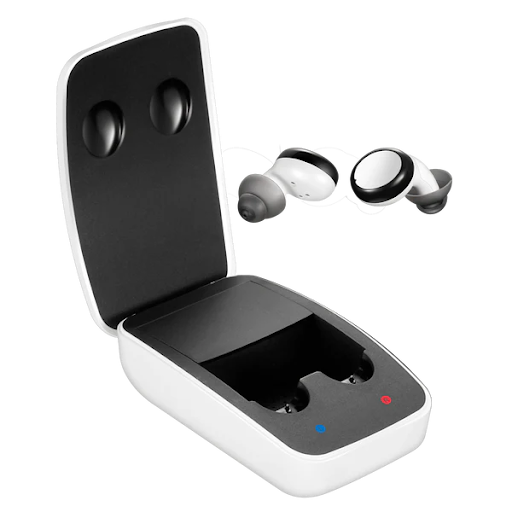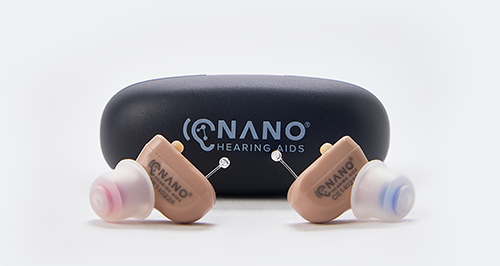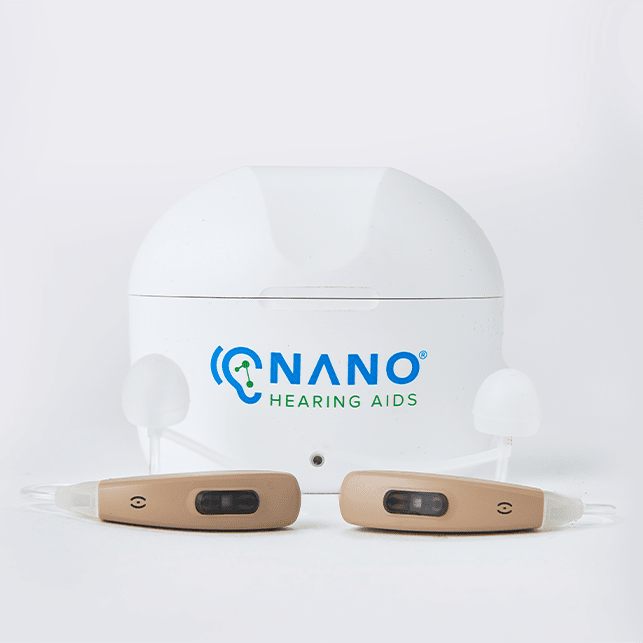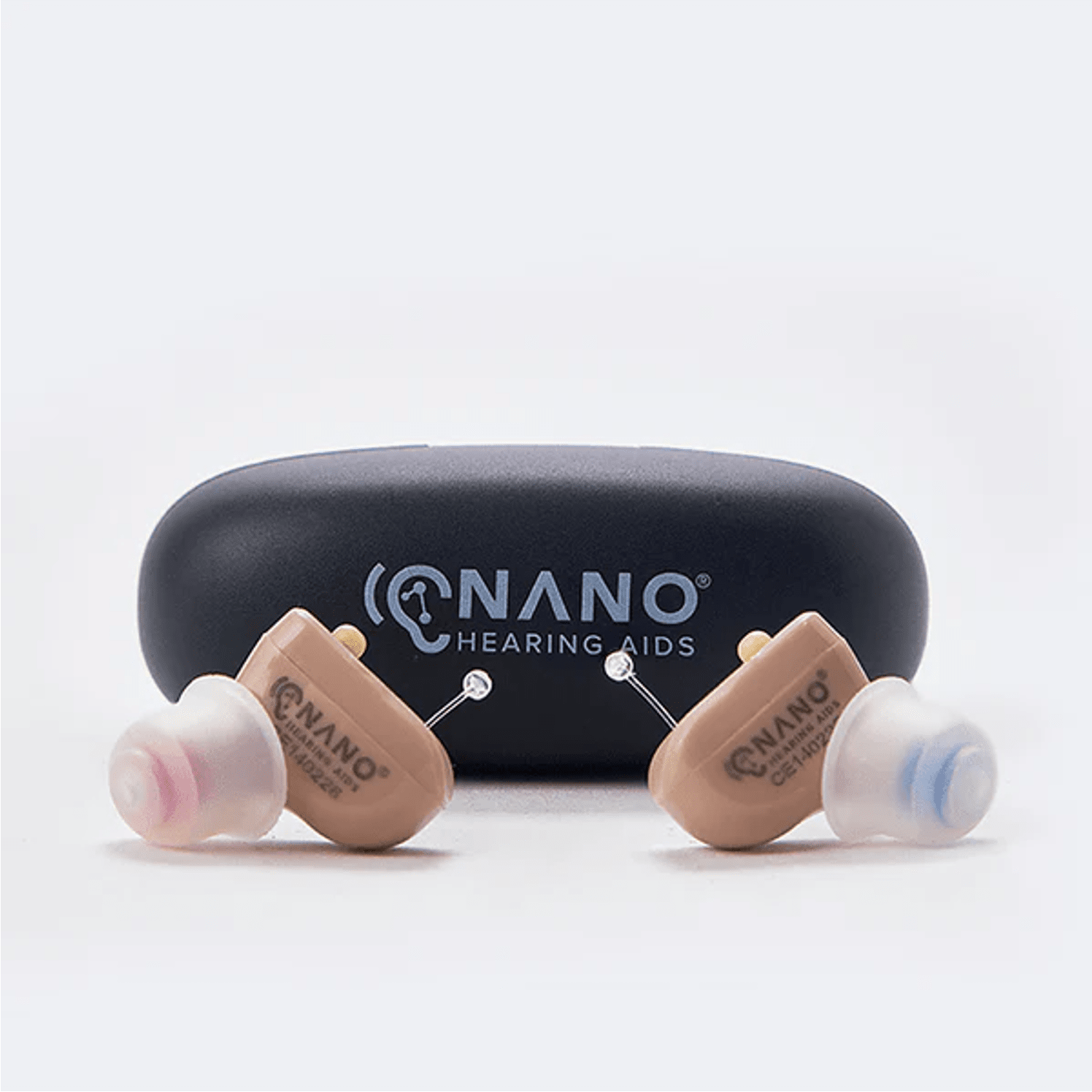Key Takeaways
- Presbycusis is a common type of hearing loss that occurs gradually as we age.
- Hearing aids, cochlear implants, and assistive listening devices are possible treatment options for presbycusis.
- Regular hearing checks are essential for early detection and management of presbycusis.
- Lifestyle changes and preventive measures can slow the progression of hearing loss.
- Nano OTC hearing aids are a cost-effective and convenient choice for adults with perceived mild to moderate hearing loss, offering sound amplification without needing a prescription.
What is Presbycusis Hearing Loss?
Are you finding it increasingly difficult to follow the conversation during family dinners? Have you noticed that the birds' chirping is no longer as clear as it used to be? This could be presbycusis, the medical term for hearing loss that naturally occurs with age. It's not sudden but a gradual decrease in hearing ability, affecting both ears.
Degrees of presbycusis hearing loss:
- Mild presbycusis hearing loss: Individuals may start to notice difficulty hearing high-pitched sounds, such as birds chirping or certain consonants in speech, leading to slight misunderstandings in conversations. This level of hearing loss is often in the range of 26 to 40 decibels (dB HL), where understanding speech in noisy environments becomes challenging.
- Moderate presbycusis hearing loss: Hearing loss deepens to between 41 to 55 dB HL, making it harder to follow conversations, especially when background noise is present. The clarity of higher frequency sounds is significantly reduced, affecting the ability to hear alarms, ringing phones, or the voices of children and women.
- Severe presbycusis hearing loss: This stage represents a profound difficulty in hearing, with losses exceeding 56 decibels. Communication becomes significantly impaired, requiring louder volumes for understanding speech, and even then, the clarity of words is compromised. This level of hearing loss greatly impacts the ability to engage in social activities and maintain connections with others.
NANO Hearing Aids are FDA-registered, Class I devices. Our OTC hearing aids are designed for individuals over 18 years of age with perceived mild to moderate hearing impairment. With prices starting at just $297, they offer a viable solution for those looking to improve their hearing without breaking the bank.
Causes of Presbycusis Hearing Loss
So, why does presbycusis happen? The inner ear houses tiny hair cells that send sound signals to the brain. Over time, these cells can become damaged due to exposure to loud noises, changes in blood supply, or simply aging. This damage accumulates, resulting in hearing loss. Other contributing factors include genetics, which means if your family has a history of hearing loss, you might be more likely to experience it too.
Symptoms of Presbycusis Hearing Loss
- Difficulty Hearing High-Pitched Sounds: Challenges in distinguishing sounds such as 's' or 'th', affecting clarity in speech perception.
- Struggling with Conversations in Noise: Difficulty understanding speech amidst background noise, complicating communication in busy environments.
- Increasing Volume on Devices: The need to turn up the volume on TVs, radios, or other electronic devices to hear more clearly.
- Perception of Mumbling: The feeling that others are not speaking clearly, making it hard to comprehend conversations.
- Social Withdrawal Due to Hearing Issues: Avoiding social interactions or events because of the challenges posed by hearing difficulties.
Diagnosing Presbycusis Hearing Loss
During your examination, the hearing professional will look for any possible causes of hearing loss that could be treated medically. They might conduct additional tests to assess speech understanding, which is often affected in presbycusis or other types of hearing loss. These tests can help determine how much the hearing loss is impacting your ability to communicate effectively. The key is to not delay these tests, as early detection can lead to more effective management of the condition.
Treatment Options for Presbycusis Hearing Loss
Digital Hearing Aid Technologies
Hearing aids have come a long way in recent years - they can be programmed to match your specific hearing loss profile, amplifying certain frequencies more than others. They offer good sound quality and features such as noise reduction and directional microphones, which can make a significant difference in noisy environments.

Exploring Cochlear Implants
For those with severe presbycusis, cochlear implants are an option. These devices bypass the damaged parts of the ear and directly stimulate the auditory nerve. The process involves a surgical procedure and extensive rehabilitation, but for the right candidates, cochlear implants can restore the ability to hear and understand speech in a way that traditional hearing aids cannot.
Assistive Listening Devices and Their Benefits
Besides hearing aids and cochlear implants, there are assistive listening devices that can help in specific situations. For example, amplified telephones can make it easier to hear conversations on the phone, and TV listening systems can help you enjoy your favorite shows without turning the volume up to levels that might be uncomfortable for others. These devices can be used alone or with hearing aids and can significantly improve your ability to hear in challenging environments.
Living with Presbycusis Hearing Loss
Living with presbycusis means adapting to your changing hearing abilities. It's about creating strategies to communicate effectively, like choosing quieter places to talk and facing people directly when speaking to them. It also means educating your friends and family about your hearing loss so they can support you better.
Most importantly, living with presbycusis is about not letting it define you. It's about embracing the treatments and devices that can help you hear better and continuing to engage in the activities you love. With the right support and adjustments, you can continue to lead a full and active life.
Utilizing hearing aids, reading lips, reducing background noise, and positioning yourself to see speakers' faces clearly are just a few tactics that can significantly improve your communication experiences.
Can Presbycusis Hearing Loss be Prevented?
Presbycusis is an inevitable aspect of aging, but there are proactive measures you can take to safeguard your hearing and potentially decelerate its progression. By adopting certain practices, you can enhance your auditory health and possibly extend the quality of your hearing over time.
- Protect Your Ears: Utilize earplugs or earmuffs in noisy environments to prevent damage.
- Avoid Ototoxic Medications: Use medications known to affect hearing only when absolutely necessary.
- Maintain a Healthy Lifestyle: Engage in activities and habits that support overall health, indirectly benefiting hearing.
- Regular Hearing Check-ups: Early detection through routine hearing evaluations can lead to timely interventions, improving long-term outcomes.
Nano OTC Hearing Aids for Perceived Mild to Moderate Hearing Loss
Over-the-counter (OTC) hearing aids, such as those offered by Nano, are a popular and accessible option for many individuals with presbycusis. Our rechargeable devices are designed to amplify sounds for adults with perceived mild to moderate hearing loss, and because they do not require a prescription, they are a cost-effective and convenient solution. Our basic CIC Digital 2 model is currently available for $297.

When considering OTC hearing aids, it's important to select a device that meets your specific hearing needs and to be aware that they may not offer the same level of customization as prescription hearing aids. Call us at (866) 880-7173 and we’ll help you determine if our hearing aids are right for you.
Frequently Asked Questions (FAQ)
What is the Main Cause of Presbycusis Hearing Loss?
Aging is the primary cause of presbycusis, leading to gradual hearing loss, especially in high frequencies.
How Can I Tell if I Have Presbycusis?
Signs include difficulty understanding speech, especially in noisy environments, and a gradual decrease in hearing sensitivity. Diagnosis is confirmed by a hearing test performed by a hearing professional.
Are There Any Effective Treatments for Presbycusis Hearing Loss?
While presbycusis cannot be reversed, treatments like hearing aids, assistive listening devices, and auditory training can help manage the condition.
Can Lifestyle Changes Really Prevent Presbycusis?
While age-related hearing loss is largely inevitable, reducing exposure to loud noises, maintaining good cardiovascular health, and avoiding ototoxic medications can help slow its progression.





